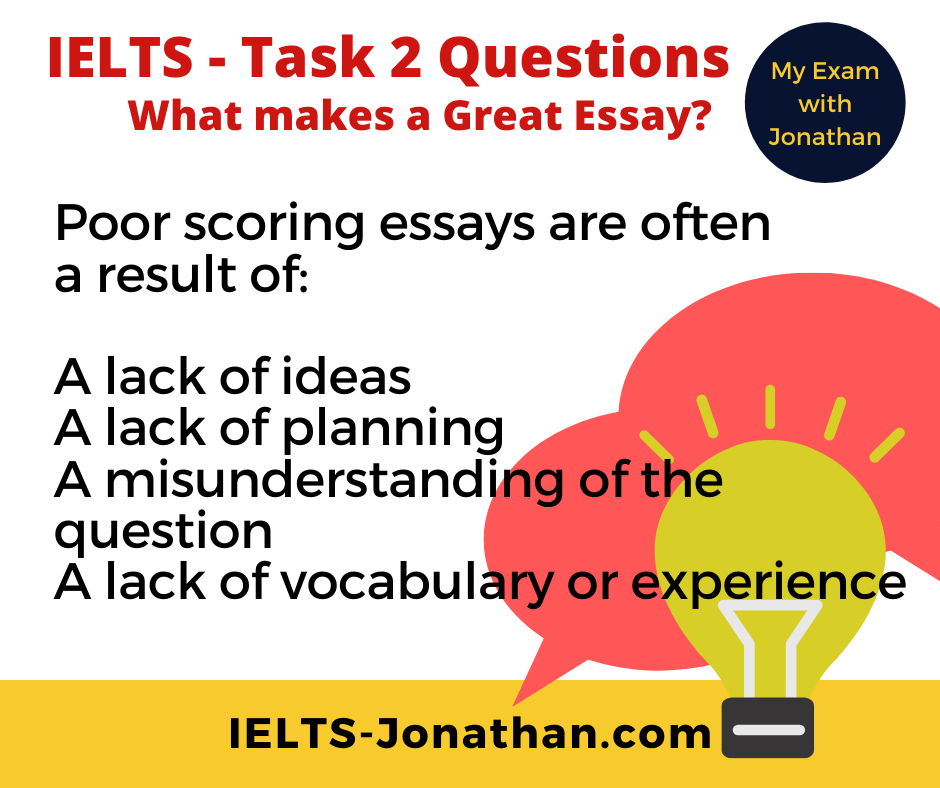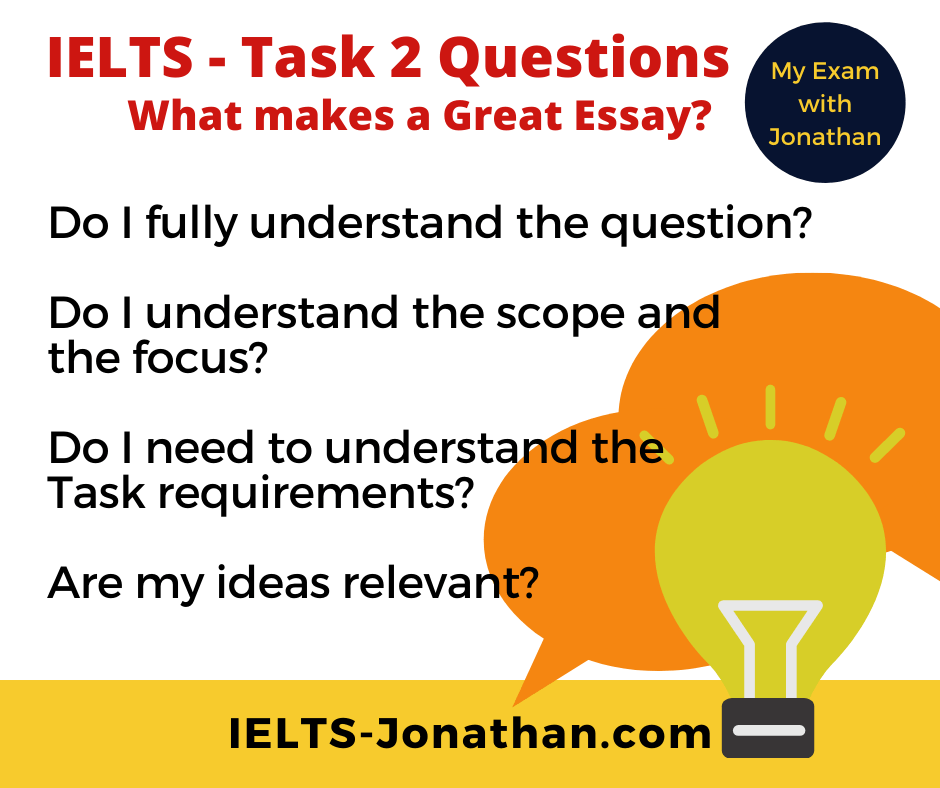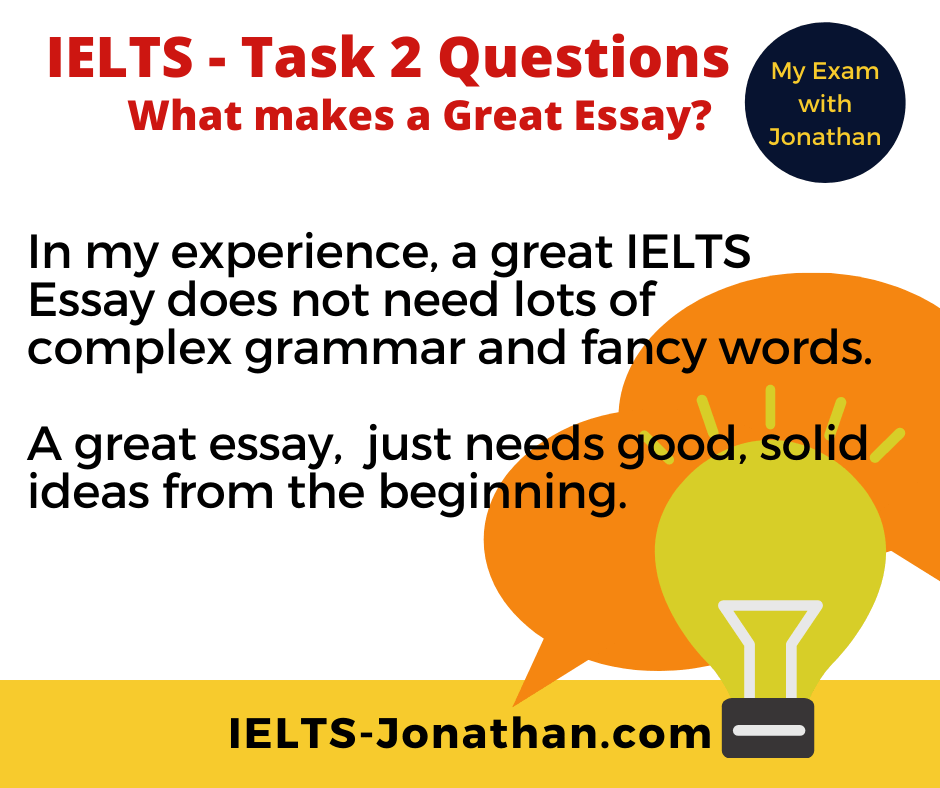Are you struggling to generate ideas for your IELTS essays?
If you have problems with writing a IELTS Task 2 essay, don’t worry, you are not alone.
In my experience, poor scoring essays are a result of:
- a lack of ideas
- a lack of planning
- a misunderstanding of the question (and being off-topic)
- a lack of vocabulary or experience
Why not try this teacher’s trick to help you generate ideas naturally AND plan your answer.
Paraphrase the essay statement into a question.
This has helped even the least confident student write an acceptable essay, and that’s an essay that can be given feedback and improved upon.
Asking a direct question helps you generate ideas and check your understanding of the question
Answer the direct question
Next, read the same question again and ANSWER it because:
- It will help you form your own opinion
- It will help make sure you are on topic
- It will help you start to plan the structure and content of your writing response
Let’s practice this briefly here together and see if it helps YOU form ideas of your own?
This is a recent IELTS question that students have been using
Increasing the price of petrol is the best way to solve growing traffic and pollution problems.
To what extent do you agree or disagree?
What measure do you think might be effective?
Write at least 250 words.
First of all, read the essay question….
You can underline or mark the keywords to help you check your understanding
Increasing the price of petrol is the best way to solve growing traffic and pollution problems.
but, ask yourself!
- Do I fully understand the question?
- Do I understand the scope and the focus?
- Do I need to understand the Task requirements?
- What are my ideas?
Next
The next step is to write the statement as a question
Just like this
Is increasing the price of petrol
isthe best way to solve growing traffic and pollution problems?
Transforming the IELTS Task 2 argument into a direct question will
- force you to make an opinion
- help you to generate ideas
- check your understanding of the question
Read your paraphrased question…
So,
“Is increasing the price of petrol the best way to solve growing traffic and pollution problems?“
Think about it? 😕
What is your response and what ideas are coming to mind?
What’s your answer?
Is it, Yes or No or maybe 😕
Don’t worry, we are thinking quickly, but if you said maybe, by how much or to what extent?
Great, so far!
You have asked the question and I imagine you have got an opinion.
Limits or scope of the question
You know you have to talk about petrol and this is the best way of solving/reducing traffic pollution problems
Now, check what other instructions you have to follow.
Do you have to give a direct opinion, or discuss a number of advantages?
In this IELTS question, you have to state how much you agree or disagree; that is, to what extent.
To what extent is increasing petrol prices the best method?
You should state this in both the introduction, and in the conclusion.
Okay? 🙂
Remember this! Don’t change you position at the end.
Be consistent!
Once you have tested your opinion, do a quick plan for the introduction that briefly states your position.
You can do this in your head, it doesn’t need to be on paper.
1) Yes, it is the best way (why is it?)
2) Yes, it is the best way (why is it?), but there are also other measures (what are they?)
3) No, it isn’t the best way (why not?)
You can use the same basic pattern to develop an answer for the first paragraph after the introduction.
Yes, it is the best way because + an example + an explanation
or
Yes, it is the best way because + an example + an explanation but there are also other measures which could be taken
or
No, it isn’t the best way because + an example + an explanation there are better measures that could be taken
Other measures
Remember, you also have to discuss some measures. This is a tricky section.
If you took the first position, how do you talk about other measures?
The advice I give to this problem is to talk about “less effective measures which could be used in conjunction with raising petrol prices.”
“Raising petrol price is the best way of reducing congestion and pollution. Of course, increasing the price of something usually reduces demand. If demand is reduced, then there is likely to be a decrease in traffic and resulting pollution. This is not the only measure that can be taken. There are less effective measures that could be used in conjunction with raising fuel prices to ease traffic problems and the resulting emissions.” ← The subject of your third paragraph.
If you took the second or third position, then writing about measures is much easier!
Yes, it is (why), but there are also other measures ( what are they) increasing the price of something, usually reduces demand. If demand is reduced then there is likely to be a decrease in traffic and the resulting pollution, but there are other effective/better measures.... ← The subject of your third paragraph.
No, it isn’t (why not) while increasing the price of something, usually reduces demand, I don’t believe this would be the case as people are too dependent on using the combustion engine. For example, in some countries, it is the only way to travel a long distance and in others, like the USA, it is seen as an essential commodity. In order to reduce traffic congestion and pollution, there are more effective and easier methods to solve these problems. ← The subject of your third paragraph.
Successful IELTS writing
What do you think about this method?
I have found that forming a question and following these simple steps helps students come up with their own great ideas.
Remember, what ideas you have are your own.
They may not be perfect, but these steps go a long way to making a coherent answer.
As always, you don’t need lots of complex grammar and fancy words, just good, solid ideas.
Anyway, here’s my answer arranged over five paragraphs.
By the way, I disagreed with the question. 😉
What do you think of my ideas? Are they clear and easy to read?
- Increasing the price of petrol is the best way to solve growing traffic and pollution problems.
To what extent do you agree or disagree?
What measure do you think might be effective?
Car ownership in developed countries is often seen as an affordable necessity. In developing countries, the use of combustion engines has been regarded as a necessary part of a country’s development. The last two decades have seen an awareness of climate change issues such as reducing city traffic congestion and pollution in the form of car emissions. While it may seem that increasing the cost of petrol would reduce car use, I do not agree that this is the best way to solve congestion and pollution problems. I believe there are more effective measures.
Simply increasing the cost of petrol is a short-term measure and affects the less wealthy members of society. While increasing the running costs of car ownership may reduce car use, it does not address our dependence on the car. In many cultures, the car dominates how people work and spend their leisure time. Simply increasing fuel cost does not address the need to solve the problems that would remain for future generations. In addition, increasing costs would penalise the average citizen more than the wealthy who would continue to use the car just as much and so the problem would likely remain. While this measure may reduce pollution and traffic to a limited extent, I strongly believe that longer term solutions and planning by governments and corporations would better address these problems.
One measure to reduce pollution could be subsidising motor manufacturers to develop and sell EV cars. Many manufacturers are already developing alternatives to the combustion engine; however, the initial purchase cost means that the majority of people cannot afford this alternative. Yet, government initiatives in many parts of China means it is increasingly common to see EV taxis, buses, and personal scooters. If China can persuade consumers to switch to EV vehicles this would lead to a significant reduction in emissions.
I believe a further way to reduce traffic congestion could be upgrading and subsidising public transport options to make this a practical and affordable alternative to using the personal car. In some cities, such as in Japan, low cost and efficient transport links have made the car almost redundant. Private and government investment may mean this could be repeated in other urban areas and in addition, public education may encourage walking or cycling which could replace short or unnecessary car journeys.
To conclude, while there are short-term benefits in raising the cost of fuel, I strongly believe that a longer-term view is required to meet the demands of reducing congestion and pollution that contribute to the bigger issue of climate change and global warming.
Words 429
I’m Jonathan
I’ve taught IELTS and University English in more than a dozen universities and schools around the world.
I’m a parent, traveller and passionate about language teaching and helping students achieve their dreams.
Whilst living in Austria or working in Asia, I run IELTS courses to help students get to where they want to be.
If you are serious about IELTS, connect with me to see how I can help you.






Was this helpful? Leave a comment :)